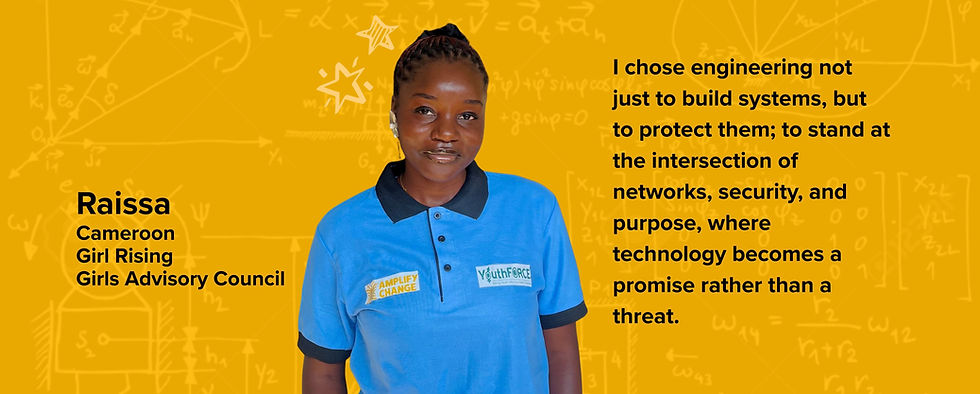Shattering Barriers: Meet the 2023 Nobel Prize Laureates
- Oct 20, 2023
- 4 min read
By Virginia Terry
Narges Mohammadi is risking her life to fight for the rights of her fellow citizens and women around the world. Claudia Goldin dug into more than a century of data to illuminate the truth about gender equity. Anne L’Huillier developed breakthroughs so that we can see electrons. Katalin Karikó saved millions and millions of lives. These are the 2023 women Nobel Prize winners.
As our 11 Days of Stories celebrating the International Day of the Girl come to a close, Girl Rising proudly shines a spotlight on the extraordinary women Nobel Laureates of 2023. These four remarkable women have claimed history by pushing the boundaries of human knowledge, overcoming tremendous barriers, including pervasive gender bias. In fields where women remain significantly underrepresented, they stand as shining examples of excellence and determination. While the Nobel Laureate community has much ground to cover in achieving gender equity, these exceptional women are helping to pave the way forward.
Narges Mohammadi: Championing Peace and Women's Rights

Nobel Peace Prize recipient Narges Mohammadi, an Iranian activist, stands as a powerful symbol of courageous commitment to justice, freedom, and gender equity. Despite serving multiple sentences totaling nearly 12 years in Tehran's Evin prison, Mohammadi continues to fight for women's rights, the abolition of the death penalty, and improved prison conditions within Iran. Her determination in the face of a repressive regime serves as a testament to the fundamental rights that should be afforded to all.
Mohammadi’s husband, Taghi Rahmani, said the Prize would further encourage her struggle and the movement she leads. “This Nobel prize will embolden Narges’s fight for human rights, but more importantly, this is in fact a prize for the Woman, Life, Freedom,” Rahmani said from his home in Paris, where he has lived in exile with their children since Mohammadi was imprisoned in 2015. Her 17-year-old son, Ali Rahmani, who has not seen her for eight years, said he was “very, very proud of my mother.”
Claudia Goldin: Bridging the Gender Pay Gap

American economist Claudia Goldin made history as the first woman to receive the Nobel Prize in economics without male collaborators. Her extensive research explores the economic lives of American women, shedding light on the persistence of the gender wage gap and the barriers that hinder women from pursuing advanced career opportunities. Goldin's work shows the importance of addressing gender disparities in the workforce, a critical step toward achieving true gender equity. Goldin has shown that the bulk of this earnings difference is now between men and women in the same occupation and that it largely arises with the birth of the first child. “Women pay a ‘motherhood penalty’ while men enjoy a ‘fatherhood premium,’” she has pointed out.
Goldin’s research shows that women have combined family and career for over a century, in one way or another - in the words of some, “having it all.” But according to her work, women receive lower wages than men for choosing children and a career.
Anne L'Huillier: Illuminating the Microcosm

Anne L'Huillier, a French-born physicist, shattered gender barriers in her field by becoming only the fifth woman in history to win the Nobel Prize in Physics. Her groundbreaking experiments in 1987 revolutionized the study of electron dynamics, allowing scientists to observe the intricate movements of electrons within atoms and molecules.
At the Nobel Prize press conference, Dr. L’Huillier was asked whether or not it is an advantage to pursue a career as a female researcher in Sweden compared to other countries. “That is a very difficult question, and the answer is both yes and no. Yes, because we have a very good system when it comes to child care, and there is acceptance from society that you can both have children and pursue a career. No, because there are very few women working in physics, and in many other countries there are more, so in that way it is easier there. My hope and belief are that it will increase, and that there will be more and more women in physics, mathematics, and technology.”
Katalin Karikó: The Messenger RNA Revolution

She grew up in Hungary, the daughter of a butcher, and decided she wanted to be a scientist, although she had never met one. Today, she is a key figure in developing the Covid-19 vaccine, saving millions of lives. Her technology is reshaping the development of vaccines around the world. In 1985, she left Hungary because the university’s research program ran out of money. She moved with her husband and 2-year-old daughter, Susan, to Philadelphia for a job as a postdoctoral student at Temple University. Because the Hungarian government only allowed them to take $100 out of the country, she sewed some cash into Susan’s teddy bear. (Susan grew up to be a two-time Olympic gold medal winner in rowing.)
Facing job insecurity, she had to move from lab to lab, with a chronically low salary, but she remained committed to exploring the potential of messenger RNA (mRNA) in developing therapies and vaccines. Her persistence paid off. After the outbreak of the COVID-19 pandemic, two base-modified mRNA vaccines encoding the SARS-CoV-2 surface protein were developed at record speed. As she and her collaborator, Drew Weissman, were vaccinated on Dec. 18 at the University of Pennsylvania under the flash of cameras with the applause of the lab team, the uncharacteristically emotional Dr. Kariko wept.
The achievements of Narges Mohammadi, Claudia Goldin, Anne L'Huillier, and Katalin Karikó resonate far beyond their respective fields. They have not only advanced our knowledge and understanding but have also shown the importance of gender equity in the pursuit of a more just and equal world. Their dedication to fundamental rights, gender equity, and scientific excellence serves as an inspiration for all. As we celebrate these Nobel Laureates, let’s remember that true progress toward gender equity benefits all of us.




Comments